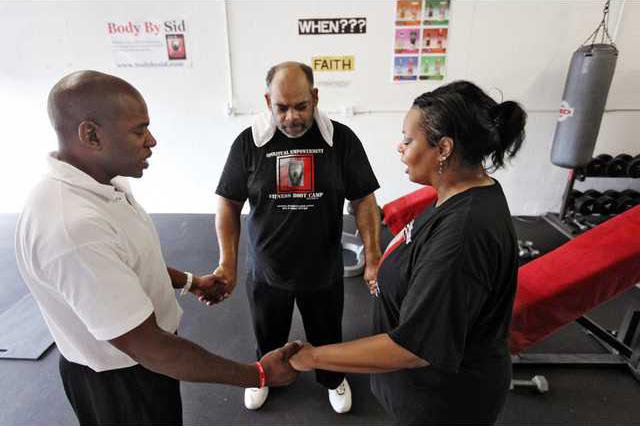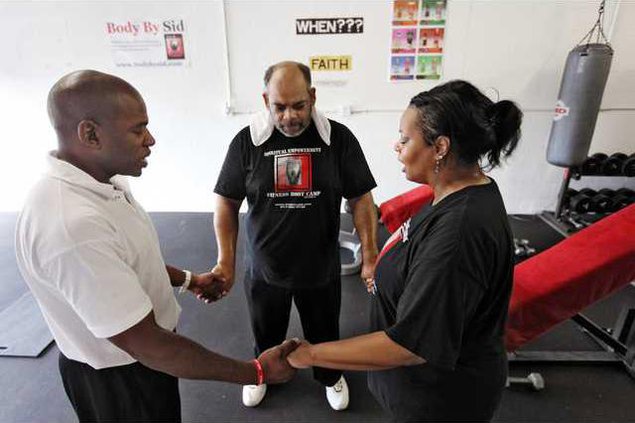People searching for a new church look for a variety of positive characteristics. They want high-quality sermons, a warm welcome and a convenient location, among other things, according to a recent Pew Research Center survey.
Soon, church hunters could also be asking, "How's the gym?"
In the U.S., more and more faith communities are adding yoga, Zumba and other workout classes to their roster of programs.
"American churches are getting into the workout biz, and the effort is blowing up. The American Council on Exercise named faith-based fitness one of the top trends of 2016," noted a recent article from Outside Magazine, appropriately titled "Thou Shalt Work Out."
These wellness ministries can lead to many positive outcomes: healthier congregations, increased interest from potential members and the opportunity to serve people's body and spirit.
"God wants us to be healthy and strong and to shine out his light for others to see," said Debbie Brown, fitness-ministry associate at Houston First Baptist Church, to Outside.
However, turning Sunday School classrooms into gyms strikes some observers as unholy. These critics worry about inviting the secular world's outward beauty standards into the sacred realm of the church.
"When we overemphasize the 'good' of good health, we may stumble into the mindset of the Jews in Jesus' day who equated disability and disease with sin. Such a perspective can reel out a new measuring tape for godliness and spirituality: the strictness of your diet, the size of your jeans, the rigor of your workout, the amount of energy you possess," Christianity Today reported in 2013.
Religious groups throughout history have addressed physical health, requiring members to follow certain diets or fast on special days. But this recent push into trendy workouts requires some new, critical thinking about the best relationships between faith and fitness, the article noted.
"Even when we aspire to better health to better serve God and others a noble goal, to be sure it's crucial to remember that God does not require us to be healthy to accomplish his mission on earth," Christianity Today reported.
The body as a temple
The most notable religious teachings on the body instruct believers on what not to do. Muslims can't eat pork and Mormons avoid coffee, tobacco and alcohol. The Jewish community just fasted for Yom Kippur on Oct. 12.
Some of these practices improve physical health, but that's not their focus. Instead, they respond to the idea that the body is a temple and that part of glorifying God involves treating the body properly.
In the 1970s, this mindset led Oral Roberts University, an interdenominational Christian school, to adopt a strict physical health standard. Students were required to work out each week and had to stay below a certain body fat percentage.
"Our bodies are the home of the Holy Spirit. Making that home a fit one is one of the ways to glorify God and the Holy Spirit," said Paul Brinson, who led the school's physical education program at the time, on a recent episode of "This American Life."
Brinson, under the instruction of the college's namesake, Oral Roberts, would track students' body fat percentage, and those who didn't fall into the accepted range would be sent home for the semester to lose weight.
"I was pretty devastated for the first couple months," said Jerri Johnston, one of the students sent home because of this program, to This American Life. "I was like, really God? Is this how you're judging people?"
Staying positive
The Oral Roberts University policy illustrates why some people are uncomfortable with the religious community's increasing interest in bringing fitness programs into the church.
However, there are plenty of positive outcomes from religiously inspired exercise that should be celebrated, too, Christianity Today reported. Members of Saddleback Church lost more than 270,000 pounds in two years after the pastor, Rick Warren, started a health plan that grew into "The Daniel Plan."
Additionally, physical activities like basketball and volleyball help bring together members of The Church of Jesus Christ of Latter-day Saints in a community. Most LDS Church ward buildings include a cultural hall, which is kind of like an all-purpose gymnasium, and people of all ages participate in activities there throughout the week.
At their best, faith-based workouts help people connect the idea that their body is a temple to a mindset that helps them celebrate it, even when they feel sick or weak or disgusted by their weight. These programs push church members to get out of their fitness comfort zones, but allow them to do so while surrounded by friendly faces.
"There's nothing like seeing a person finish their first 5K who didn't think they could. It never gets old," said Dean Thompson, race director of "Run for God" to the Deseret News last year.
On its surface, the surge in churches hosting workout classes or even opening gyms seems silly, the Outside article noted. Sweating to Christian rock music while an instructor reads Bible verses feels so different than running on a treadmill at the local 24 Hour Fitness.
But this movement has brought value to the lives of many believers, helping them explore what their body is capable of and be grateful for how God designed it, Christianity Today reported.
"It's been so eye-opening that God cares about our whole selves," said Michelle Reed, who is motivated by her faith to work out, to Christianity Today. "I want to honor him now in all the choices I make,"
Soon, church hunters could also be asking, "How's the gym?"
In the U.S., more and more faith communities are adding yoga, Zumba and other workout classes to their roster of programs.
"American churches are getting into the workout biz, and the effort is blowing up. The American Council on Exercise named faith-based fitness one of the top trends of 2016," noted a recent article from Outside Magazine, appropriately titled "Thou Shalt Work Out."
These wellness ministries can lead to many positive outcomes: healthier congregations, increased interest from potential members and the opportunity to serve people's body and spirit.
"God wants us to be healthy and strong and to shine out his light for others to see," said Debbie Brown, fitness-ministry associate at Houston First Baptist Church, to Outside.
However, turning Sunday School classrooms into gyms strikes some observers as unholy. These critics worry about inviting the secular world's outward beauty standards into the sacred realm of the church.
"When we overemphasize the 'good' of good health, we may stumble into the mindset of the Jews in Jesus' day who equated disability and disease with sin. Such a perspective can reel out a new measuring tape for godliness and spirituality: the strictness of your diet, the size of your jeans, the rigor of your workout, the amount of energy you possess," Christianity Today reported in 2013.
Religious groups throughout history have addressed physical health, requiring members to follow certain diets or fast on special days. But this recent push into trendy workouts requires some new, critical thinking about the best relationships between faith and fitness, the article noted.
"Even when we aspire to better health to better serve God and others a noble goal, to be sure it's crucial to remember that God does not require us to be healthy to accomplish his mission on earth," Christianity Today reported.
The body as a temple
The most notable religious teachings on the body instruct believers on what not to do. Muslims can't eat pork and Mormons avoid coffee, tobacco and alcohol. The Jewish community just fasted for Yom Kippur on Oct. 12.
Some of these practices improve physical health, but that's not their focus. Instead, they respond to the idea that the body is a temple and that part of glorifying God involves treating the body properly.
In the 1970s, this mindset led Oral Roberts University, an interdenominational Christian school, to adopt a strict physical health standard. Students were required to work out each week and had to stay below a certain body fat percentage.
"Our bodies are the home of the Holy Spirit. Making that home a fit one is one of the ways to glorify God and the Holy Spirit," said Paul Brinson, who led the school's physical education program at the time, on a recent episode of "This American Life."
Brinson, under the instruction of the college's namesake, Oral Roberts, would track students' body fat percentage, and those who didn't fall into the accepted range would be sent home for the semester to lose weight.
"I was pretty devastated for the first couple months," said Jerri Johnston, one of the students sent home because of this program, to This American Life. "I was like, really God? Is this how you're judging people?"
Staying positive
The Oral Roberts University policy illustrates why some people are uncomfortable with the religious community's increasing interest in bringing fitness programs into the church.
However, there are plenty of positive outcomes from religiously inspired exercise that should be celebrated, too, Christianity Today reported. Members of Saddleback Church lost more than 270,000 pounds in two years after the pastor, Rick Warren, started a health plan that grew into "The Daniel Plan."
Additionally, physical activities like basketball and volleyball help bring together members of The Church of Jesus Christ of Latter-day Saints in a community. Most LDS Church ward buildings include a cultural hall, which is kind of like an all-purpose gymnasium, and people of all ages participate in activities there throughout the week.
At their best, faith-based workouts help people connect the idea that their body is a temple to a mindset that helps them celebrate it, even when they feel sick or weak or disgusted by their weight. These programs push church members to get out of their fitness comfort zones, but allow them to do so while surrounded by friendly faces.
"There's nothing like seeing a person finish their first 5K who didn't think they could. It never gets old," said Dean Thompson, race director of "Run for God" to the Deseret News last year.
On its surface, the surge in churches hosting workout classes or even opening gyms seems silly, the Outside article noted. Sweating to Christian rock music while an instructor reads Bible verses feels so different than running on a treadmill at the local 24 Hour Fitness.
But this movement has brought value to the lives of many believers, helping them explore what their body is capable of and be grateful for how God designed it, Christianity Today reported.
"It's been so eye-opening that God cares about our whole selves," said Michelle Reed, who is motivated by her faith to work out, to Christianity Today. "I want to honor him now in all the choices I make,"

